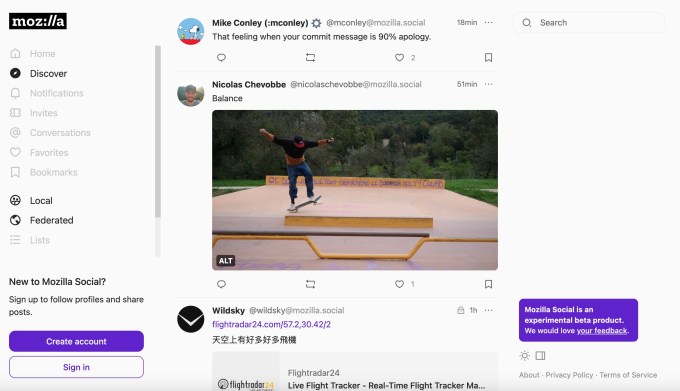[ad_1]
Consumers are hungry for a new way of social networking, where trust and safety are paramount and power isn’t centralized with a Big Tech CEO in charge… or at least that’s what Mozilla believes. The mission-driven tech company behind the Firefox browser, Pocket reader and other apps is now investing its energy into the so-called “fediverse” — a collection of decentralized social networking applications, like Mastodon, that communicate with one another over the ActivityPub protocol.
The idea is to rethink social networking from the ground up.
Today, social networks are often run by large corporations — like Meta, Snap and Google — where advertisers pay the bills. This has created a world where modern social networks are profit-driven, and consumer needs aren’t always at the forefront, Mozilla believes. This disconnect between what people want and what today’s networks offer hit an inflection point last year, when billionaire Elon Musk bought Twitter, leading to a surge of interest in alternatives to centralized social networking, including apps like Mastodon and Bluesky.
Under Musk, Twitter — now called X — has prioritized “free speech” managed by crowdsourced-based moderation. Its policies have resulted in increased hate speech and toxic content on the platform, some studies have shown.
Mozilla believes there’s a better way forward and, more importantly, that now is exactly the right time to invest in that path. And, as a wholly owned subsidiary of a nonprofit, the company says it’s not motivated by generating earnings for shareholders or returning a VC investment, allowing it to progress with a collaborative approach where it takes in input from a lot of different voices.
In an interview with TechCrunch, Mozilla Senior Director of Content Carolyn O’Hara explained why Mozilla has taken an interest in the fediverse and Mastodon, specifically, and how it expects to experiment in the months ahead.
For background, the company announced its plans to enter the fediverse in December 2022 and this May launched a private beta for Mozilla.social, a Mastodon server — or “instance” in fediverse parlance — that will allow consumers to participate in this new form of social networking where problems like misinformation, harassment and issues around worsening mental health are minimized.
The company’s work on its social efforts is also available publicly on GitHub. (Of interest to technical folks, the company is using a forked version of Elk as its alternative web client for its Mastodon server, which is what gives it its slick look and feel.)

Image Credits: Mozilla (opens in a new window)
Mozilla’s involvement, says O’Hara, came about because the company looked at the history of social media over the past decade and didn’t like what it saw.
“I think that it’s a pretty poor track record by existing companies that are only model motivated by profit and just insane user growth, and are willing to tolerate and amplify really toxic content because it looks like engagement,” she says. “[They] aren’t just putting forward the kind of standards that are good for people, but are just good for their bottom lines.”
Plus, she adds, consumers are now becoming aware of this, which is new.
“Consumers feel that the vibes are off a little bit…these platforms aren’t necessarily working in their best interests, or satisfying them,” O’Hara points out.
For Mozilla, that discontent presented an opportunity to enter the social networking space and compete for consumers’ attention. In its case, however, the broader goal is to help the fediverse itself gain traction, not just its own Mastodon server.
“We’re not seeking to get, like 2 billion users on our instance. We want people to have choice and agency,” says O’Hara, adding that choice is in line with Mozilla’s values.
However, the company is aiming to tackle some of the obstacles that have prevented users from joining and participating in the fediverse so far, including the technical hurdles around onboarding, finding people to follow and discovering interesting content to discuss.
For starters, users will join the Mozilla.social instance with their Mozilla accounts, which also provides access to the Firefox browser, Mozilla’s VPN, Pocket and other products, simplifying access to its suite of tools. The instance isn’t yet open to the public, but is experimenting with hundreds of users for the time being.
“We’re keeping the number intentionally small and we’re prioritizing the groups that we’re proactively reaching out to,” O’Hara explained. “The communities we’ve worked with previously will have first access to the private beta, some of which will include folks from the waitlist.”
The timeline to a public launch isn’t yet determined, as the company plans to experiment with various expansions and features throughout next year.
For example, Mozilla is currently experimenting with a Discover feed that aims to surface engaging content. Over time, it plans to gather more signals from around the fediverse to determine what sort of content people are interacting with. It also sees a role for its read-it-later app Pocket in this experience, as the app’s primary use case is to store links to articles and other content that people have signaled they want to read.
“We are planning to open the beta in phases because we want to ensure that we have a content moderation team and other tools that can be scaled relative to the size of the user base. We’re not in a rush as we think it’s important to be deliberate about launching social media tools,” O’Hara says.

Image Credits: Mozilla
“We have a lot of core competency that we brought over from our Pocket experience and other recommendation products that we put together to at least get that engine revving,” notes O’Hara.
Initially, the company is running a Mastodon account, “@[email protected],” where it actively posts recommendations of stories to read. It’s the same sort of content you might find in the Pocket email newsletter, but now distributed on the fediverse.
The company also wants to address the needs of creators and publishers who want to broaden their audience as it moves forward with its fediverse plans.
“From a content discovery standpoint, I’m really interested in how we can seed conversations and seed experiences with really high-quality content — certainly, editorial publisher content,” says O’Hara. “How can we get publishers and content providers involved early?… I think of them as a real constituency for us,” she says. Plus, Mozilla wants to bring in the originators whose posts lead to interesting conversations and keep the network active.
O’Hara says Mozilla is now in active discussions with publishers to understand their needs, including both their social needs and business needs, and how those goals may have changed over the past year. As part of these discussions, Mozilla aims to convince publishers that Mastodon isn’t just another place they have to support, but one that could deliver on their objectives. As it learns from the publishers and other content creators what they want and need, it then intends to use that understanding to build features and drive efforts that can help them reach their audiences.
So far, what Mozilla has learned is that publishers today feel somewhat resigned and pessimistic about social networks. Twitter isn’t driving much traffic and, even though Instagram Threads appears interesting, Meta specifically said it wasn’t going to prioritize news on that platform. What Mozilla wants to accomplish, then, is to help reconfigure the Mastodon onboarding process so that when someone — including a publisher or creator — joins its instance (or the fediverse in general) they’re able to build their audience with more ease.
“The baseline is just better onboarding, better connecting with accounts and communities,” explains O’Hara. “You might be interested in spaces where you can have the kinds of conversations that you want to be able to have; trust and safety practices that make you feel safe in order to participate. And I think also then access to content that spurs those conversations and seeds those conversations. And it all being kind of a delightful user experience — but we’re at the early days of that,” she adds.

Image Credits: Mozilla (opens in a new window)
Another avenue of thought is to create spaces within the fediverse where consumers can have civil and direct conversations within smaller communities, instead of shouting into the void, so to speak. As to what that will look like, is less clear. Will it be different instances or just new ways of forming communities, by building out features or experiences? O’Hara couldn’t say, only noting that experimentation will be needed.
Importantly, trust and safety will also be key to Mozilla’s instance. Its content policies indicate strict measures around hate speech, impersonation, self-harm, harassment, misinformation, violent and sexualized content, and more, in addition to illegal content, like CSAM (child sexual abuse material) and promotion of illegal goods.
But there’s a chance that playing it too safe can make a product less compelling as a Twitter/X alternative. That’s one takeaway, at least, from the recent shutdown of Pebble (formerly T2), a Twitter clone that put trust and safety at the forefront of its development process. The app never gained more than 20,000 users, and the founders now believe that its approach to moderation may have been correct, but it wasn’t a growth driver. In other words, people may say they want to feel safer when participating online, but clearly, that isn’t their only need.
Mozilla’s instance, still in private testing, has a small team of moderators that will grow when the instance launches to the public in the coming months.
“It’s not just a commitment, it’s beyond foundational for us — that is the thing that is going to be true about this instance,” O’Hara says of Mozilla’s plans to heavily moderate its space. Though Mozilla will also rely on technology to do some of the work, it wants to make sure the human moderators, “feel protected, supported and respected for their work,” she adds.
“We are saying out the gate that this isn’t a neutral platform,” O’Hara stresses. “We think that that’s often used as this crutch to allow, or even amplify, really toxic content in the name of engagement… In some cases, platforms aren’t just brave enough to actually just take things down.”
Building directly on the fediverse isn’t the only way the company is prompting new forms of social networking. The company has also financially backed a startup, Mammoth, the makers of a third-party app for Mastodon.
Mozilla has been leaning into its values around inclusion, dignity, security, agency and community for 25 years, O’Hara says, and those will guide its efforts in the fediverse, as well.
“We’re going to have rules on how people can engage with one another…it’s the fediverse, you have lots of other places to go if you don’t want to abide by those rules,” she adds.
Users can provide Mozilla with feedback via @Social @Mozilla.social or by using the hashtag #mozillasocial within the product.
[ad_2]
techcrunch.com




